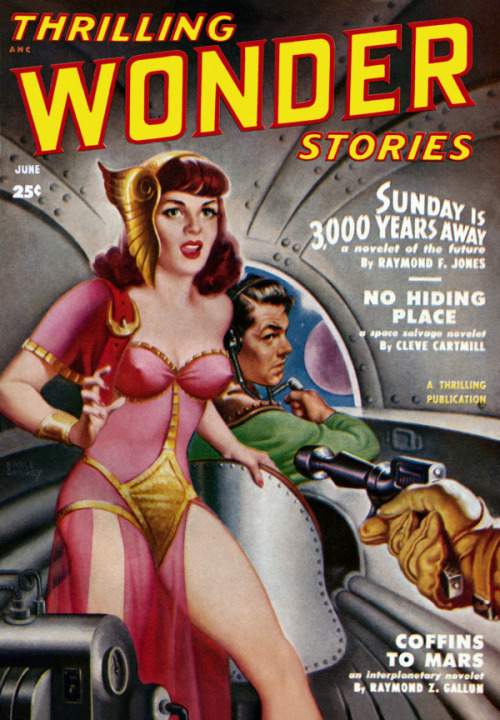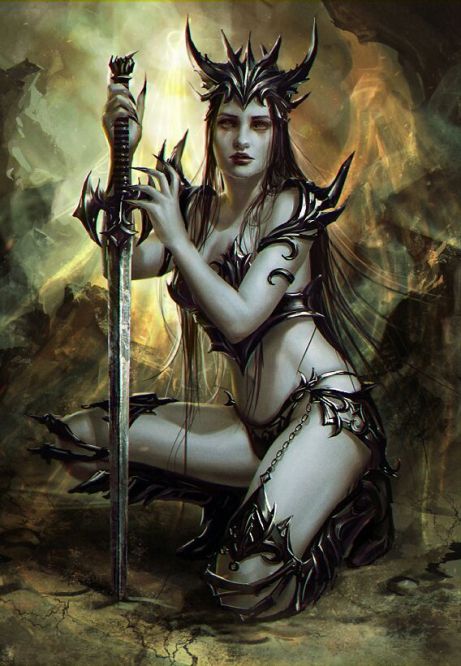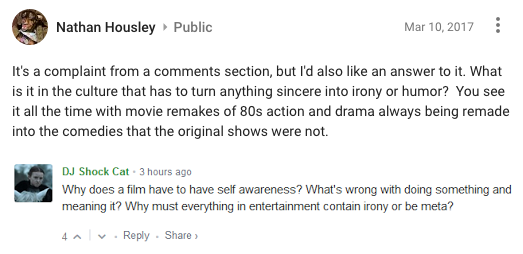SENSOR SWEEP: Unsympathetic Protagonists, Self-contained Worlds, Nightmare Territory, and Indian Stuff You Shouldn’t Bother
Monday , 13, March 2017 Sensor Sweep 13 Comments Pulp Revolution (Benjamin Cheah) ‘Gritty’ and ‘Realistic’ SFF Isn’t — “In the dark SFF style championed by Abercrombie and Martin, we only see the unpleasantness. A Song of Ice and Fire is marked by murder, betrayal, rape, intrigue, incest, rape, atrocities, war and of course, rape. SFF books in a similar vein feature unsympathetic protagonists with no redeeming traits, wanton cruelty and sadism, and temporary or hollow victories by the more sympathetic characters—if they indeed secure victories at all.”
Pulp Revolution (Benjamin Cheah) ‘Gritty’ and ‘Realistic’ SFF Isn’t — “In the dark SFF style championed by Abercrombie and Martin, we only see the unpleasantness. A Song of Ice and Fire is marked by murder, betrayal, rape, intrigue, incest, rape, atrocities, war and of course, rape. SFF books in a similar vein feature unsympathetic protagonists with no redeeming traits, wanton cruelty and sadism, and temporary or hollow victories by the more sympathetic characters—if they indeed secure victories at all.”
Appendix N (Barbarian Book Club) The Horror Stories of Robert E. Howard — “Howard’s characters are not your usual pansies that populate modern horror. No, these guys are tough %@*!%$s that when presented with tentacled horrors from the stygian depths they go a killing with sword and pistol. In one of my favorite stories, The Horror from the Mound, when our cowboy protagonist accidentally digs up a 17th-century Spanish Vampire buried by Conquistadores who begins murdering the local Mexicans, he doesn’t run away. Hell no, he breaks its spine and sets the moldy %@*!%s on fire.”
Bro, do you even read? (The Verge) Science fiction would be unrecognizable without women — “After Shelley, male authors laid claim to science fiction, with H.G. Wells, Jules Verne, and Edgar Allan Poe writing their own landmark stories that steered the direction of the genre. Hugo Gernsback, the publisher of Amazing Stories, was openly shocked to see women writing ‘scientification’ in 1927, when Clare Winger Harris took third place in one of the magazine’s writing contests. But women never stopped producing imaginative fiction, even when their male contemporaries made little room at the table for them.”
Appendix N (Searching for Dragons) Appendix N: Choice Cuts V.1 — “See when I had first moved here, I had this ‘idea’ of what America would be like. I thought it was all huge, open, tracts of wild land. With the occasional dot of civilization here, and there. Well, I was totally wrong. However, this book reminds me of that brief wonderful time that I had an ‘ideal’ America in my head. With deep woods, spooky mountain hollows, and Indian stuff you shouldn’t bother. (Saying that is probably racist now, isn’t it? Meh. It’s the perception I had as a kid.) This book delivered that feeling in truck-loads. I loved it.”
Pink Slime Watch (Vox Popoli) Amazon rejects Pink SF — “A fantasy, at its root, specifically focuses on magic and the supernatural as the primary motivators of the plot, presented within a self-contained world. In a fantasy, the presence of magic and the supernatural is the driving motivator of the plot.”
Writing (Nick Cole’s Books) Pick My Next Project! — “Idea # 2 A Retelling of Conan from the Howard novels. Except he’s a terminator/cyborg in a brutal post apocalyptic future. He comes from Thinking Machine enclave called NoMan’s Land (Cimeria). Now he’s entered the civilized lands of man on a quest to understand and find other AIs.”
Pulp Revolution (The Last Redoubt) Tha Backstory, tha Whole Backstory, and Nothing But tha Backstory, Pt 1. — “You get what you focus on. Origin stories are only one kind of basic structure, and if you keep taking time in the movie to tell the origin stories of everyone, especially the protagonist, you either end up with all origin movies, wasting precious time telling the origin before getting to the real story, or ridiculously long movies with large chunks of the beginning wasted. Worse, the backstories and origin stories we get these days are so over the top. Or, used to explain why the bad guy isn’t really that bad instead of being about growth, or even worse, as L. Jagi Lamplight Wright noted, why they’re really the victim.”
Appendix N (The Writings of Jon Del Arroz) Retro Review: Fire Time by Poul Anderson — “Fire Time is the grand science fiction sense of wonder at its finest. It has hard science fiction elements, dealing with real possibilities of what biologically, geologically and sociologically happens to a planet when it has three suns to contend with. It has space opera elements as humanity is dealing with a far off war with another alien species. It has fantasy elements, as the main alien species, the Ishtarans, are comprised of centaurs who act rather Roman-esque in their honor code and fighting, and are at typical fantasy level technology. Fire Time is a striking blend of different sub-genres that is refreshing to read on a lot of levels.”
Pulp Revolution (Kairos) Paging Dr. Warpig — “Literary fiction–books about shallow narcissists coming to terms with dying polar bears via hate-sex–is outselling science fiction.”
 Pulp Revolution (The Jesse Lucas Saga) Sword and Flower by Rawle Nyanzi — “Sword and Flower is not only closer, though, to the stereotype we seem more closely to be asking for, but to the format and feel of the old pulps. Mollison writes like a father telling stories for our entertainment and moral instruction, Nyanzi writes like he’s got ideas bubbling out of his exposed veins that he wants us to hear about and that he also wants to pay some bills with them. I could see him ramping up his output and publishing under five different pseudonyms. Rawle Nyanzi, as far as I could feel from reading the words he ripped from his soul and offered for sale, as authors must, has true pulp spirit. I’m a little jealous.”
Pulp Revolution (The Jesse Lucas Saga) Sword and Flower by Rawle Nyanzi — “Sword and Flower is not only closer, though, to the stereotype we seem more closely to be asking for, but to the format and feel of the old pulps. Mollison writes like a father telling stories for our entertainment and moral instruction, Nyanzi writes like he’s got ideas bubbling out of his exposed veins that he wants us to hear about and that he also wants to pay some bills with them. I could see him ramping up his output and publishing under five different pseudonyms. Rawle Nyanzi, as far as I could feel from reading the words he ripped from his soul and offered for sale, as authors must, has true pulp spirit. I’m a little jealous.”
Pulp Revolution (Seagull Rising) Review: Sword and Flower by Rawle Nyanzi — “It’s certainly creative. You’ve got Japanese sorcery, Christian soldiers, Valkyries, clerics, and bizarre extra-dimensional living fortresses. That’s a heck of a recipe, and yet all of those disparate myths and legends are sewn together to make a seamless whole. Not a single one of those items feels out of place or shoved in at random – a common failure of ‘kitchen sink’ style tales.”
Formula (Karl Gallagher) I blame Joseph Campbell. — “Sure, it’s a good plot, especially if you’re targeting teenage boys. But it’s not the only plot. Yet there’s Hollywood writing courses that say all movies follow the Hero’s Journey, even pure bodice-ripper romances. So all these mistaught writers think they need to put a “call to adventure” and “refusal of the call” in their plot line. Which prevents any story with The Man With No Name walking into town from getting greenlit.”
Movies (The Jesse Lucas Saga) Why The Ender’s Game Movie Failed — “How on Earth can you trust an audience to understand we’re scared of an alien invasion without blowing your budget on fighter jets getting blasted out of the sky? Gotta have action first off so you won’t lose your audience. What, it might not make it real? Might not raise the stakes? You put an American kid who gets bullied for being a third child in a beat-up uniform in a worn-down space station and audiences will get it. But I wouldn’t trust the director to understand what makes the story tick because he puts Ender on an FTL starship for the final battle.”
Pulp Revolution (RMWC Reviews) The Sky is Falling — “If audiences are leaving the Big Five because the stories are boring and the community is a bunch of snooty CHORFS, but still want to experience stories of wonder and excitement and adventure because that’s been a part of human entertainment since before the Sumerians saw fit to etch the Epic of Gilgamesh onto clay tablets, where will they go? To the communities that are excited about sharing new stories of adventure and digging up authors whose works have been forgotten for so long that they’ll feel fresh and new to a generation just discovering them.”
Comics (Ron Edwards) Scary war — “Get this: the series is hosted by Death, full of explicit horror and occult elements, including post-apocalyptic stories like ‘The Day After Doomsday.’ Its terrifying twin was Marvel’s War is Hell, 1973-1975, which began with reprints of old war comics, then shifted into nightmare territory, in which Death is the main character, forcing a doomed soldier to die countless lives in war theaters across history…. I am baffled that I should have been an avid reader of such novels as The Forever War by Joe Haldeman and stories like ‘Run for the Stars’ by Harlan Ellison, but such a wuss about these. They’re totally of a piece with my seminal influences described in A dangerous vision and Your mama’s apocalypse.”
Books (Thibault Serlet) The 4th Generation Warfare Handbook — “Lind’s explanation about why the counter-insurgencies often fail make perfect sense. The rules of 4th Generation Warfare turn all convention 2nd and 3rd generation strategies on their head. When the distinctions between states and non state actors, between soldiers and civilians, or between moral and immoral become blurred, all of the rules of warfare are changed. In traditional wars, the side which takes the most casualties wins, while the side that takes the least loses. In traditional wars, you wing by applying the maximum rather than the minimum amount of force. In traditional wars, defense is key, and consolidating your forces is critical. In the 4th Generation of War, all of these old fashion rules of conflict have been turned on their head.”
Superversive (SuperversiveSF) Yes Virginia, there is Sci-Fi — “The problem isn’t the splitting off of sci-fi and fantasy. The problem is not the loss of blurred genre categorizations. It is the loss of heroism. It is the loss of love, and philosophy. It is the loss of courage. It is the loss of the transcendant – a loss that can be seen in hard and soft sci-fi, in fantasy and science fantasy. In short, it is the loss of the superversive.:

Thanks for including me in the sweep, and sorry for my sailor speech making extra work for you.
Your nod to Kairos is much appreciated, Jeffro!
Thank you for spotlighting my work.
Thanks for the mention!
Like this: “Nyanzi writes like he’s got ideas bubbling out of his exposed veins that he wants us to hear about and that he also wants to pay some bills with them.”
Joseph Campbell, John Campbell, both doing damage. It’s a Scottish saying that there never was treachery but there’s a Campbell behind it.
-
Joseph Campbell never FORCED anybody to write anything. JWC did, as far as it was within his power. More bashing on Campbell for simply pointing something out. I suppose you blame Einstein for nuclear weapons, then? When morons misuse a tool, blame the morons.
I guess THE HOBBIT, A CHRISTMAS CAROL and Robert E. Howard’s THE HOUR OF THE DRAGON are out there “damaging” things as well, since they provide perfectly good — and “damaging” — examples to follow. Just because some Lefties have fetishized the “reluctant hero” — which is not essential to the Monomyth — doesn’t make Joseph Campbell’s observations “damaging”. Many Leftist professors hate Campbell, BTW. Should we hate Shakespeare for the countless bad 5-act plays written in the last 500yrs?
-
Please calm yourself, sir. I was merely riffing on the Karl Gallagher entry title linked above to make a joke. The Campbells betrayed and massacred my ancestral clan hundreds of years ago; semi-humorously, I don’t trust a one of them; I know it has nothing to do with the matter at hand. I find what little Joseph Campbell I’ve read to be overly reductive, anti-Christian, and Freudian, but I freely admit it is very little.
-
I wasn’t getting excited. I’m simply tired of people with minimal knowledge of what Campbell said blaming the Hero’s Journey for everything up to, and including, the trains not running on time. Lester Dent’s “pulp formula” has produced plenty of trash in the last 80 years as well.
I’m no fervent acolyte of Campbell myself. In fact, I can testify that the only times I’ve ever mentioned the Hero’s Journey online — until the present dogpile — was when I was pointing out that Lucas was using it as a smokescreen to hide the fact that STAR WARS was basically FELLOWSHIP OF THE RING with Mount Doom tacked on. The obvious ignorance of what Campbell wrote shown by those constantly strawmanning the “reluctant hero” is what motivates me to respond. If people were trying to say that John Locke — whom I dislike — “invented communism”, I would go to his defense as well. Blaming someone for something they didn’t do accomplishes nothing.
It’s odd that you cite “reductionism” as a fault when you reduce all Campbells to what some of them did three centuries ago. That’s some good Gaelic-grade hatred there. I should know, since I have Gaelic Irish and Gaelic Scots on both sides — plus Nixons from bloody Liddesdale. I’ve visited Loch Lomond but not Glencoe.
Here’s a joke for you: What’s it like when you get Gaelic Alzheimer’s?
You forget everything but the grudges.
-
Is it just me, or does the girl on the WONDER STORIES cover look a little like Katy Perry?
One could’t help but expect write up on forgotten female fantasists of yore, from the title of that Verge article. Instead, article focuses on same old regulars like Le Guin or modern bestsellers like Rowling, whereas the likes of C.L. Moore and Andre Norton are only mentioned in passing alongside other authors, almost as if writer picked them from some wikipedia article or other.
-
Moore, Brackett, Norton: they’ve all been memory-holed. They griped little to never about “sexist bias”, so they’re posthumous agents of the Patriarchy.
CJ Cherryh recently won an award. She neglected to shriek about her oppression and stated that she never considered herself a “women’s writer”. Despite the award, how often do you see Cherryh mentioned in articles like the one above? She’s a fan of Moore, Brackett and Norton, BTW. If you’re not bitching about the Patriarchy like Le Guin, Russ, Leckie and others, you’re part of the problem, sister.